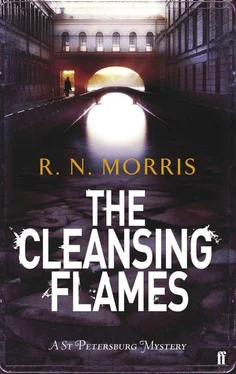R. Morris - The Cleansing Flames
Здесь есть возможность читать онлайн «R. Morris - The Cleansing Flames» весь текст электронной книги совершенно бесплатно (целиком полную версию без сокращений). В некоторых случаях можно слушать аудио, скачать через торрент в формате fb2 и присутствует краткое содержание. Год выпуска: 2011, ISBN: 2011, Издательство: Faber and Faber Fiction, Жанр: Исторический детектив, на английском языке. Описание произведения, (предисловие) а так же отзывы посетителей доступны на портале библиотеки ЛибКат.
- Название:The Cleansing Flames
- Автор:
- Издательство:Faber and Faber Fiction
- Жанр:
- Год:2011
- ISBN:0571259154
- Рейтинг книги:5 / 5. Голосов: 1
-
Избранное:Добавить в избранное
- Отзывы:
-
Ваша оценка:
- 100
- 1
- 2
- 3
- 4
- 5
The Cleansing Flames: краткое содержание, описание и аннотация
Предлагаем к чтению аннотацию, описание, краткое содержание или предисловие (зависит от того, что написал сам автор книги «The Cleansing Flames»). Если вы не нашли необходимую информацию о книге — напишите в комментариях, мы постараемся отыскать её.
The Cleansing Flames — читать онлайн бесплатно полную книгу (весь текст) целиком
Ниже представлен текст книги, разбитый по страницам. Система сохранения места последней прочитанной страницы, позволяет с удобством читать онлайн бесплатно книгу «The Cleansing Flames», без необходимости каждый раз заново искать на чём Вы остановились. Поставьте закладку, и сможете в любой момент перейти на страницу, на которой закончили чтение.
Интервал:
Закладка:
He knew that he would not get to sleep again that night. But that decisive realisation was also somehow liberating. He settled down to address the turmoil of his thoughts, without being distracted by the anxieties of insomnia.
Surprisingly, perhaps, he found himself thinking about Prince Dolgoruky; or, more specifically, about his demon. He imagined it there in the room with him, squatting foully on its haunches, leering in the darkness. He could not quite believe in it. When he tried to put a face to it, his mind — peculiarly — supplied the face of Porfiry Petrovich. And so it was a demon with pale, almost translucent skin, with a face as feminine and cunning as a peasant woman’s, with eyes the colour of ice and transparent lashes flickering restlessly over them. He sensed the bulbous prominence at the back of its head, and was repelled by it.
But this demon, it seemed, had the power of metamorphosis, for he saw that its face had changed into that of Alyosha Afanasevich Botkin. And so it was now a hatchet-headed demon, with a wild incendiary stare trapped behind circular spectacle lenses. No sooner had the demon settled into this incarnation than it began to change. Its neck stretched out impossibly. Virginsky’s mind’s eye craned upwards to see the face of Tatyana Ruslanovna Vakhrameva looking down at him with an expression of aloof indifference. This was the Tatyana Ruslanovna of old, the sexually knowing woman-child with the drifting, dangerous gaze. He felt an ache of longing and unhappiness. He knew from her glance that she was utterly unattainable, no matter what crimes he might commit to please her.
He didn’t like to see the demon as Tatyana Ruslanovna. He willed it to assume another form. But the demon seemed to want to torment him, for it held onto Tatyana Ruslanovna’s features with obstinate cruelty.
Of course, at no point did he actually believe that there was a demon there with him in the room. Was that the difference between him and Prince Dolgoruky? he wondered. Virginsky, ever the materialist, knew full well that the demon was simply a product of his own mental processes, that it was something he himself had created, possibly to represent that aspect of himself that was capable of evil. (He took it for granted that he was capable of evil.) Indeed, he had no real sense of the demon as existing outside his mind. Pursuing this impeccably rationalistic analysis, he saw that the projection of other people’s faces onto the demon was an attempt by his unconscious mind to shift the blame for his negative acts onto others.
He shook his head without raising it from the cushion it rested on. Such moral cowardice would not do. He had to take responsibility for his own acts, for all of them. And so he attempted to will his own face onto the demon, for that would be the only honest representation. But even after a conscious, creative effort, he could not make the demon wear his face. It was as if the part of him that had conjured it into being simply refused to countenance such an outcome.
He was growing tired of the demon. He wanted it to be gone. He wanted to prove his mastery over it, over the negative aspects of his personality. And the last face it wore, before it dissolved into the soft grains of night, was that of his old professor, Tatiscev.
*
The walls of the apartment blazed with panels of luminosity, sharp geometric sections of sunlight. A wash of cold pallor spread across the parquet floor.
‘You are to stay in the apartment. Don’t go out. Don’t answer the door. Stay away from the windows, too. You must not be seen by anyone, do you understand?’ Kirill Kirillovich’s habitual look of sour disappointment was momentarily transformed into one of sour disapproval.
Virginsky experienced a nostalgic pang as he contemplated the angled projections of spring. ‘Tatyana Ruslanovna said you are to get me clothes.’
‘There will be time for that later.’
‘But if someone comes to the apartment and I am seen in my civil-service uniform, they are more likely to suspect something. If I am dressed as a workman. .’
‘If you are dressed as a workman, you will convince no one. I have never seen a more unlikely workman.’
‘That was Tatyana Ruslanovna’s wish. It was the wish of the central committee.’
‘Sometimes, like a theologian interpreting the Bible, one must interpret the commands of the central committee. Having done so, I do not feel it is necessary to supply you with the clothes.’
‘But that is not interpretation. It is contradiction. Furthermore, you chose a suspiciously reactionary analogy.’
Kirill Kirillovich regarded Virginsky without enthusiasm. ‘This is all beside the point. I have already told you that you are not to open the door to anyone. What need is there for disguise?’
‘Is there any news of. . of the man I shot?’ The question surprised Virginsky as much as it did Kirill Kirillovich.
‘I don’t know. I haven’t been out yet. I haven’t had a chance to see a newspaper.’ He frowned impatiently and then added, ‘Do you care?’
‘No,’ said Virginsky quickly.
‘You don’t care whether he lives or dies?’
Virginsky felt unsure how to answer, sensing the question was a trap. It will be like this from now on , he thought. ‘No. I really don’t,’ he claimed.
Kirill Kirillovich did not seem to be impressed. ‘I suppose it makes little difference to you now. They will not go any easier on you if he lives. However, as far as the cause of social revolution is concerned, it would be better if he died.’
His wife, Varvara Alexeevna, came into the room as he said this. Her face assumed an uneasy expression. She averted her gaze sadly to the floor and spoke with quiet determination: ‘You know, Kirill Kirillovich, that I share your aspirations concerning the foundation of a more just society in the future. However, I cannot, in all conscience, condone such bloodthirsty sentiments. I spend my days bringing new life into this world. I see what a precarious and treasured thing it is. I will not sit at the breakfast table, fill myself with pancakes and then blithely call for another being’s destruction. The deed is done. Perhaps it was a necessary deed. I don’t know anything about that. But as far as it was a political act, it is complete. The political point has been made. So let us hope that this magistrate survives, as his death adds nothing, and pleases no one, or so I would hope.’
Virginsky felt obscurely shamed by her words.
Kirill Kirillovich sighed. ‘We have talked about this before, Varvara Alexeevna. And as I have had occasion to remark in the past, you must put aside such sentimental prejudices. It is simply not consistent for you to say that you share my aspirations but reject my means — for you know in your heart that there is no other way. The future can only be born out of the destruction of the past. Just as some women inevitably give up their own lives during childbirth, for all your best endeavours.’
The colour rushed to Varvara Alexeevna’s cheeks at this intrusion of the personal. ‘But not all women die in childbirth!’ she protested.
‘No, but those who do. . do. What I mean is that it is inevitable in certain cases. In the same way, it is equally inevitable that some, perhaps many, will have to die before a new order can be established. We cannot prevent it. Therefore we should not lament it.’
‘Only a man could be so glib.’
‘And only a woman could be so. .’ Kirill Kirillovich broke off to consult the ormolu clock. ‘I must go.’
‘What? Only a woman could be so what ?’ demanded his wife.
But Kirill Kirillovich only shook his head in sour distraction, as he rose to leave.
*
‘Your husband refused to get me any clothes. The clothes that Tatyana Ruslanovna ordered you to provide for me.’
Читать дальшеИнтервал:
Закладка:
Похожие книги на «The Cleansing Flames»
Представляем Вашему вниманию похожие книги на «The Cleansing Flames» списком для выбора. Мы отобрали схожую по названию и смыслу литературу в надежде предоставить читателям больше вариантов отыскать новые, интересные, ещё непрочитанные произведения.
Обсуждение, отзывы о книге «The Cleansing Flames» и просто собственные мнения читателей. Оставьте ваши комментарии, напишите, что Вы думаете о произведении, его смысле или главных героях. Укажите что конкретно понравилось, а что нет, и почему Вы так считаете.












